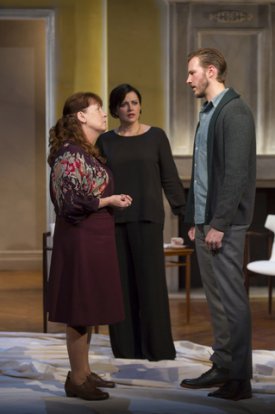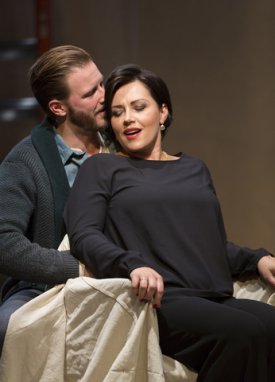Night Is a Room
A Greek tragedy wannabe that shocks and amuses in equal measure.

Ann Dowd, Dagmara Dominczyk and Bill Heck in a scene from “Night Is a Room” (Photo credit: T. Charles Erickson)
[avatar user=”Joel Benjamin” size=”96″ align=”left” ] Joel Benjamin, Critic[/avatar] Naomi Wallace has fashioned an outrageously ridiculous, brilliantly written play that constantly and happily slaps the audience in its face with one coup de theatre after another. That Night is a Room succeeds as well as it does is thanks to Wallace’s scintillating way with words and her ability to fashion clear, if slightly clichéd, characters: the irritating, aging, full-of-themselves English yuppie couple and the kooky, but brighter-than-she-looks working class mother who drolly destroys their happy marriage.
Divided into three scenes, Night is a Room takes place in Leeds, England, where advertising exec Liana (an earthy, yet elegant Dagmara Dominczyk) decides to give the fortieth birthday gift of a mother to her handsome, successful schoolteacher husband, Marcus (tall, quietly intense Bill Heck). The gift—which cost Liana thousands of pounds—comes in the form of a face-to-face with his biological mother who gave him up at birth. Tough cookie, Doré (an adorably wicked Ann Dowd), reluctantly acquiesces to Liana’s request, although it’s revealed later that Marcus always knew where his mom lived and, to Liana’s surprise and disappointment, never told her.
Liana meets her in the dingy backyard of Doré’s working class house. Immediately, a quiet battle of words and wills signals trouble ahead. Liana is coolly, almost mockingly superior as she responds to Doré’s somewhat outrageous inquiries. They joust warily, blow up silly balloons and make a date for Doré to meet Marcus. (Signal the ominous chords in the background.)

Bill Heck and Dagmara Dominczyk in a scene from “Night Is a Room” (Photo credit: T. Charles Erickson)
At Liana and Marcus’s comfortable suburban home, redecoration is in full swing: walls are partially painted, temporary furniture is in place and there is an air of expectation as they await Doré. Marcus quite explicitly makes love to Liana which, as we soon discover, is a way of diverting attention from the shocking secret Marcus and Doré share. When it is revealed, all hell breaks loose, the kind of hell that almost, but not quite, can’t be expressed in words. Wallace finds a way, but also includes lots of furniture tossing and attempted physical violence.
When this benighted trio next get together, six years have passed and time has taken its awful toll on each of them. (The central plot twist is what makes the play pruriently fascinating. Revealing it might be against the unspoken ethics that govern theatrical reviewers.)
The title comes from a William Carlos Williams poem: “Night is room/darkened for lovers/through the jalousies of the sun/has sent one golden needle.”
A Greek tragedy in every sense of those words, Night Is a Room, is far more playful than that genre of dramatic writing, going more for shock value than moral edification.

Bill Heck and Dagmara Dominczyk in a scene from “Night Is a Room” (Photo credit: T. Charles Erickson)
The pleasure of Night Is a Room is watching these three expert actors speak Wallace’s rich, insightful language which veers from wittily highfalutin to excitingly vulgar. Charting their emotional reactions which teem with hyperbolic outbursts, she has her finger on the pulse of these three self-deluders. Bill Rauch directed with total comprehension, walking a fine line between permitting the audience to observe the drama and also be mystified and appalled by these awful people.
Rachel Hauck’s three sets perfectly symbolized the essence of the writing while Clint Ramos caught the characters’ emotional journeys in his telling, modern costume designs. Jen Schriever’s lighting and Leah Gelpe’s sound design underlined the theatricality of the plot.
Night Is a Room (through December 20, 2015)
Pershing Square Signature Theatre
Signature Theatre, 480 West 42nd Street, in Manhattan
For tickets, call 212-244-7529 or visit http://www.signaturetheatre.org
Running time: two hours including one intermission






Leave a comment